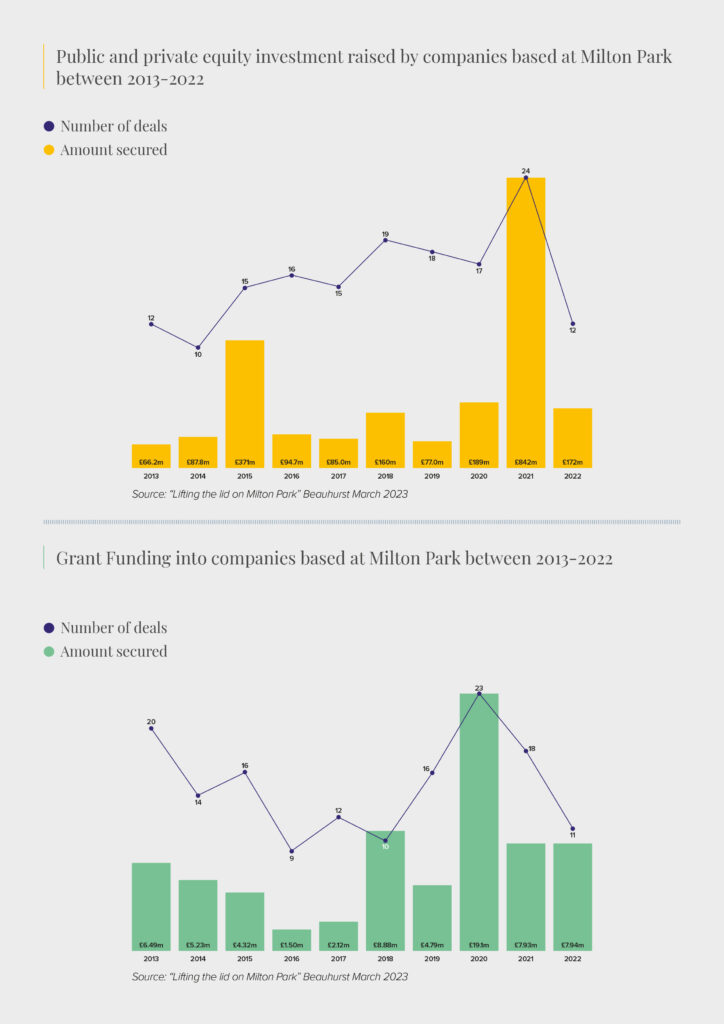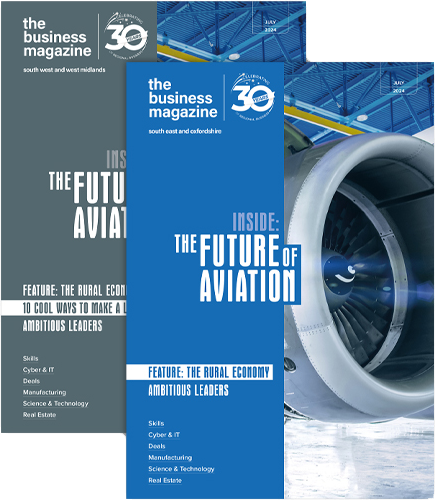Over 7% of UK life sciences investment secured by Milton Park companies

Companies based on Milton Park have cumulatively secured £2.14 billion of equity investment, new research has revealed.
The findings, uncovered by high-growth insights firm Beauhurst, show that life science companies at Milton Park, located between Abingdon and Didcot which is one of the largest science and technology destinations in the UK, secured an impressive 7.56 per cent of the UK’s total equity investment in the sector, equating to £953 million. In 2021 alone, £842 million in investment was generated, with the pioneering T-cell receptor biotech Immunocore raising £189 million, followed by £226 million for drug discovery company Exscientia, both of which are listed on the New York-based NASDAQ stock exchange.
The green energy sector also attracted major investment, including fusion energy technology fi rm Tokamak Energy and battery technology specialist Nexeon. Since 2013, a total of £136 million equity investment has been secured by Milton Park companies working in the green energy sector, while £18.4 million worth of grants have also been awarded.
Further analysis shows that of the 57 high-growth companies based at Milton Park, 12 have spun out from academic institutions. The most popular sectors for high-growth companies include pharmaceuticals and technology, featuring established companies such as AI and predictive software company OBS Medical and global environmental consultancy APEM alongside venture stage firms, such as patient data capture software company Isansys Lifecare.
The latest Beauhurst figures show that the combined turnover from companies at Milton Park reached £10.8 billion, while £68.3 million of grant funding was secured over the past 10 years.
The value of clustering
The celebrated 19th century British economist Alfred Marshall was apparently the first person to identify the value of business clusters.
His theory went that concentrating key industry sectors in specific regions boosted economic activity and therefore productivity, drew more highly skilled workers attracted by a wider choice of employers, facilitated the exchange of goods and ideas, promoted competition and cooperation and supported industry.
High volumes of firms in proximity encourage companies to invest more in innovation because of the increased competition. These innovations in turn increase the levels of knowledge in the region.
Philip Campbell, Commercial Director at MEPC Milton Park, said: “The Oxfordshire cluster has an impressive range of innovative companies, a rich history and great access to world class universities, talent and infrastructure. It remains one of the fastest growing economies across the UK, with degree level qualifications and employment rates far higher than the national average.
“Using these foundations, our 2040 Vision will see Milton Park grow to more than four million sq ft, supporting the Golden Triangle and wider UK ecosystem to become an innovation nation.”
The publication of the Beauhurst findings in March coincided with the launch of the government’s plan to cement the UK’s place as a science and technology superpower by 2030.
The strategy includes a raft of new measures backed by more than £370 million to boost investment in innovation, bring the world’s best talent to the UK, and seize the potential of ground-breaking new technologies like AI.
The new Science and Technology Framework is the first major piece of work from the newly created Department for Science, Innovation and Technology.
Science, innovation and technology drive economic growth
Science, innovation and technology are the drivers of economic growth and productivity, and more than half of the UK’s future labour productivity growth will come from adopting the best available technologies and the rest from pushing the frontier of technology even further, said the government. Each £1 of public investment in research and development leverages £2 of private R&D investment in the long run, generating a huge amount of public benefit in return.
Philip Campbell added: “A common theme in the Beauhurst report is clear: the companies based at Milton Park are trying to make all our lives better, whether it’s Evotec making important advances in life-saving drug treatments or Emergex Vaccines improving human health by providing long-term immunity for some of the world’s most pressing diseases.
“It’s a real privilege to provide a home to companies taking phenomenal steps to address global problems, located in a region which is at the forefront of innovation, collaboration and connectivity. It still gives me a buzz and I can’t wait to see what lies ahead.”
Nigel Tipple, Chief Executive at Oxfordshire Local Enterprise Partnership, said: “The findings in this report demonstrate Milton Park’s impressive contribution towards Oxfordshire’s world-leading innovation cluster.
“The increasing number of high-growth companies we’re seeing across the county are pivotal to ensuring global advances are continued to be made across life sciences, technology and energy while supporting our local communities and UK PLC.”

Milton Park was acquired by MEPC in 1984. It has since trebled in size and now hosts more than 270 companies, from small start-ups to businesses which compete on the global stage. The park’s 2040 Vision will help it expand to four million sq ft, accommodating 20,000 people on site. This investment will take the Park from its current status as a leading science, technology and business park to a pioneering research and innovation district, keeping environmental sustainability front and centre.




















